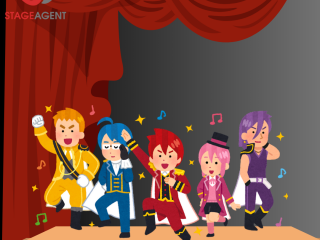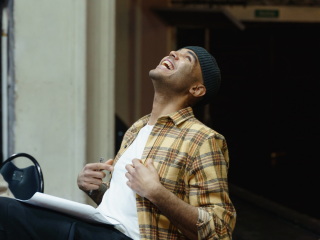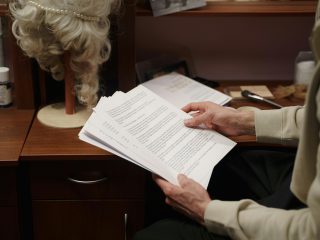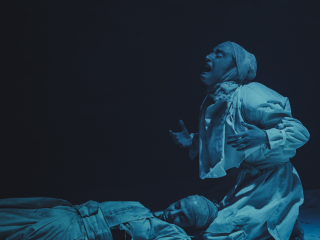Content Warning: Mentions of assault & non-consensual situations
I’m at an audition, and I’m young. An adult, but young. The director tells us that he is going to pair us up and, as part of our audition, have us kiss our scene partners. We are confused. The director senses our confusion and clarifies: he will give us scene partners and various scenarios in which we should enact a kiss. He reminds us that kissing doesn’t have to be sexual or romantic–there are kisses on foreheads between family, on hands at the end of a date, on cheeks between friends.

I am young, I am eager to please, and I accept his explanation. Though the format seems odd, I don’t pause to give it much thought. I am ready to act.
I don’t stop to think that we are in an audition where we feel obligated to prove our worth. We are competing against one another…and the challenge that we have been given is an intimate connection with another person. We are to create that connection within moments– without direction, without unpacking, without time. I look around me and I see that a few others are concerned; some people are taking issue. But not me, I’m ready to show everyone that I am worthy.
The director assigns me a partner who is also young. I await our kissing scenario, which we are given a few minutes to put together. Will I be a mother, kissing his forehead? Will we be friends, parting ways? I’m ready. “So he’s gay,” the director says. “And your job is to convince him he’s not.”
That was our scenario. That was our kiss. A definitive sexual expectation woven in, not to mention the horrifying underlying messaging that someone can be convinced of their sexuality in the first place. My partner, who I was just meeting, was much like me. He was eager to give a good audition. We crafted a plan together that involved us kissing on the lips. With only minutes to plan, it seemed like that was the clearest way to honor the director’s intention. Wanting to prove our dedication, my partner and I went along with it. We both consented to the choice we made. We practiced the physicality and checked in with each other to ensure comfort throughout. We consented to our final product, and I suppose, by not leaving the audition or requesting a different scenario, we consented to the nature of the audition itself. But did we?

When I look back on that audition, there is so much to unpack. Even recounting it now, I feel shame for having gone along with it, for having wanted to participate, to please, for having planned to give my best performance by adhering to what was being asked of me without a second thought.
And that’s what leads me to this blog…actors are often made to feel that they must give consent. The best directors and scene partners are trained to ask for it, sure–but at the end of the day–we are also trained to say yes.
In a good production or program, intimacy and touch are thoughtfully staged with the actor’s consent and comfort, in a way that is practiced, controlled and safe, and where everyone has a voice. (You can read our interview with Intimacy Director Sarah Lozoff here).
But…how do we deal with the notion that we are expected to consent if we want to be seen as castable? Expected to consent if we want to keep our cooperative reputation? Expected to consent because we are told that our bodies are our tools to be used at the discretion of our directors?
I didn’t question that former director for a moment. I didn’t question his choices, his intentions. I didn’t question my safety, even. Not then.

A decade later, I heard a group of actors talking about our fellow performer. She was struggling with a particularly intimate moment in a play, which she openly acknowledged was related to her own personal trauma. These actors spoke about her as though she lacked professionalism. Like her asserting her boundaries, acknowledging her discomfort and needing patience would put her on a blacklist in the future, she would be known for being “difficult.”
——
More recently, I watched a director complain that they were behind schedule because one of their actors needed more time than anticipated to perform their stage kiss comfortably.
——-
It’s not just twenty years ago. It’s now. It’s perpetual. We are creating spaces in our industry where we feel rushed to comply, and where any lack of immediate compliance is seen as, at very least, an inconvenience to the whole of the production.
A good production may ask for your consent. But that ask is often theatre in itself, because you are meant to say YES.
I can talk about assault. I can write plays of my personal experience, I can discuss feelings in a workshop, I can be present in a talkback. I can watch it on TV. I have very few physical boundaries when it comes to performances or friendships or my partner. But every so often, something hits differently and I am not okay.
But often I cannot voice that I am not okay when I am not okay.
Because I have been trained to say “yes.” I have been trained to say “Yes, and.” I have been trained that my body is a tool. I have been trained to take a note. I have been trained that I am present to carry out the director’s vision. I have been trained that “It’s acting” so it shouldn’t affect me. I have been trained that you comply to get ahead. I have been trained to be agreeable, to be castable, to be quiet. I have been trained to do the job no matter what the job entails.
As actors, we are trained to say yes if we want to keep working.
Please, don’t just ask consent. Create space for no. Create time for “later”. Find empathy and patience and backup plans. Don’t let someone’s boundary be perceived as an inconvenience.
I know it’s hard to remember when you’re creating a world, but….it’s just a play.















